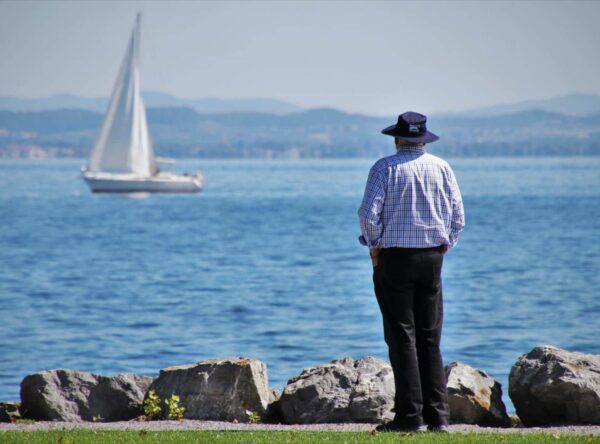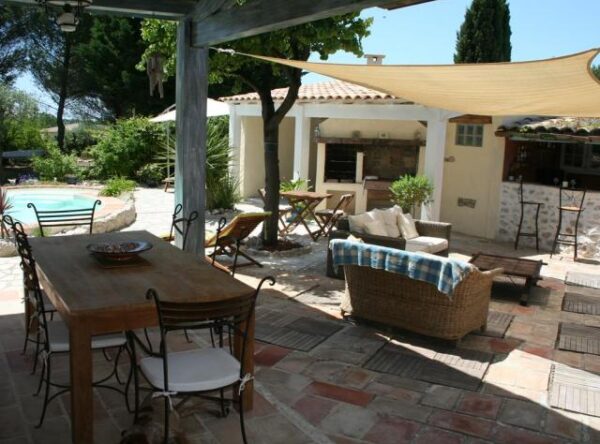Whether you already live in France when you reach retirement age or whether you move here after you’ve retired – France has a lot to offer for seniors. Our marvelous client Linda is a senior citizen herself and lives in La Rochelle – she shares some of her personal experiences and tips for aging well in France:
I came to France at the age of 70, having long dreamed of living here. Given my age, I had some concerns about things like housing options for seniors, affordable health care, and getting around. Would this really be the right place to spend the rest of my life? With the help and encouragement of Dennelle at Renestance, I took the plunge and I have no regrets.
Being retired in France has worked out much better than I could have imagined. The cost of senior living here is significantly lower than it is on the Central Coast of California. I pay much less for groceries, healthcare is ridiculously cheap and, best of all, I find the French to be extremely warm, kind, and welcoming.
I also disagree with statements that the bureaucracy is terrible here. To me, the French simply like to plan and provide for every possible eventuality.
Does all this mean that I did not experience any “culture shock” or period of adjustment? Of course not, but I love it here in France and cannot imagine living anyplace else. I just received my ten-year residence card and I plan to live here for the rest of my life.
All that said, here are some things I’ve learned that may be useful to other people who wonder what aging and being a senior is like in France.
Housing and Accommodations for Seniors
When I first moved to France, I lived in an apartment in Sète that I had bought. After a couple of years I decided that those hot summers in Sète just weren’t for me. I moved to the town of La Rochelle on the Atlantic coast, where I live in a senior residence.
I decided on that option knowing that I would eventually need to be in a place where I could get some assistance. That has worked out very well – especially during the Covid pandemic, when getting around by bus just wasn’t a good option. In this senior residence I can be as independent as I want, knowing help is available if and when I need it.
There are different kinds of senior accommodation in France. There are “Résidences Services Seniors” for seniors who can live independently (I live in one of those) and EHPADs (“Établissements d’Hébergement pour Personnes Âgées Dépendantes”) for seniors who cannot reasonably live on their own and need medical help. Both types of accommodation for seniors have their distinct variations and it’s important to investigate the specific offerings of any that are of interest.
For instance, although my résidence services seniors is theoretically for independent seniors, it actually provides a combination of independent living and assisted living. This is accomplished through contracting and paying for extra services as one ages and needs more help.
The basic services included in the monthly rent include handling of mail and packages, maintenance of common areas, occasional entertainment events and outings (such as trips to the market), a couple of regular classes, and daily lunch as well as a telealarm service which consists of a bracelet and pendant with emergency call buttons. Through WIFI connection to a special telephone, emergency help can be summoned, 24/7, with just the push of a button.
Various other services are provided “à la carte” at extra cost. I do my own housework and ordinarily require no special assistance. The only extra services I use are transport (staff members drive me to and from appointments) and arrangements for getting necessary preventative care (flu shots and covid vaccinations). My best friend here, who is in her late Eighties, pays for extra help from the residence itself (housekeeping, grocery shopping, laundry) and from outside providers (daily assistance bathing, and dressing). Most of her needs for help can be met in this way, but when she hurt her leg and needed extra medical care and therapy, she could not stay here, and had to reside for several months in a rehabilitation center (“centre de rééducation” ) while she recovered.
Other outside services that I find helpful are the ability to shop from home, and the availability of home hairdressing services. You can buy pretty much anything online and have it delivered. Here in La Rochelle, there are five grocery chains that offer home delivery. I also use the services of a “Coiffeuse a domicile”. All the usual hair salon services are available.
It is advisable to carefully and thoroughly research the quality and services of any facility by visiting and looking at its reviews before signing a contract. However it is always possible to move to another residence if things should change – I am currently on a list for another residence and expect to move next year.
Public Transport in France
Getting around in France is ridiculously easy for seniors, so long as you don’t live in an out-of-the-way place or a very small community. The public transportation services in many cities are outstanding. I cannot specifically speak for other communities of course, but here in La Rochelle, the local public transport provider “Yelo” is fantastic. The buses run on time, and the transport center is staffed with very helpful people. “Yelo” also offers a special service for people with mobility problems. It costs the same as a regular bus ride, but transport is provided door to door in a special van that can handle wheelchairs. To qualify, you have to provide the specified proof of reduced mobility.
I also occasionally use a VTC (“vehicule touriste avec chauffeur”) locally, which is a bit expensive, but reliable. Getting taxis in France is not always easy as some drivers don’t want to make trips they consider to be too short to be worth their while.
To travel further I take the train. The efficiency and reliability of the French train system is legendary. Of special interest to seniors is “Accès Plus”, the special services of SNCF (“Société Nationale des Chemins de Fer Français”) for those with reduced mobility. The basic service of “Accès” Plus is free.
I have used this service myself and it’s wonderful if you have to navigate one of the really big railroad stations. You check in when you begin your journey and a nice person with a wheelchair takes you to your train, sees that you get to your seat, and stows your luggage. Other persons meet you at any interim transfer points and at your final destination.
SNCF also provides a “Home + Train Service” for those who may need extra help getting to their destinations.
One caveat with French train travel is the same for everyone regardless of age: One does have to be prepared for the regular strikes that temporarily disrupt service. They are usually announced beforehand in the news and there is a website (unfortunately only in French) where one can look up planned strikes.
Healthcare in France
I find the French healthcare system to be radically better than the one in the United States. It is far more efficient and exponentially less expensive.
From a senior’s point of view, there are some particular features worth noting:
Visiting nurses are a fixture at the senior residence where I live. There is no need to go to a medical facility to get blood drawn, injections administered, your blood pressure checked, and other basic medical services. The staff of this residence regularly goes to the nearby pharmacy to pick up prescriptions and vaccines. I have them pick up my flu vaccine every year. I store it in the refrigerator until the visiting nurse comes to give me the shot. I show her my medical system card (“Carte Vitale”) and the card for my “Mutuelle” (top-up-insurance), and that’s it.
Many doctors will make house calls, and the emergency service “SOS Médecins” can send a doctor to your home in case of emergency 24/7. I cannot speak to its availability in very small or isolated communities, but it is available in most of France. If you call France’s health emergency number 15, the operator may send an ambulance or may connect you with an SOS médecin. I have not used this service myself, but have been told that the service can generally have a doctor at your residence within an hour.
Dental care is also very good and notably cheaper than that provided in the United States. Depending on where you live and if you need an English-speaking dentist, it can take a while (up to several months) to get an appointment for a regular exam and cleaning, but it’s pretty easy to get an emergency appointment.
Eyeglasses are the one exception to the rule that medical care is cheaper here. I find that the prices are about the same as they are in the U.S. The eye exam is much less expensive, but if you want anything other than a very basic pair of glasses in cheap, low-quality plastic frames, be prepared to pay a lot for them. I recently paid about 300€ for two pairs of glasses in nice (but not really “designer”-style) frames.
The challenges
Yes, there are actually a couple of downsides for some seniors living in France.
Mobility Challenges
If you have a mobility challenge (I have a bad knee), it’s important to be aware of a couple of things. The sidewalks in many cities are often not in great condition, with cracks and holes and dips. For some reason, the French go to great lengths to provide wonderful bike lanes and paths, but seem to forget about pedestrians.
The other issue I have encountered is stairways. Many buildings do not have elevators. Some types of buildings are legally required to have elevators, but owners often manage to get exceptions. Only last year the railroad station here in La Rochelle put in an elevator so that it is now fully accessible for people with reduced mobility. Previously, “Accès Plus” helpers had to wheel people across the actual working railroad tracks (after communicating with someone in the tower to make sure that no trains were coming). That was okay in nice weather, but not so good in winter. This condition still exists in other railroad stations in the country.
Estate Planning
One final (literally) thing to consider if you are thinking of retiring in France is estate planning. If you have family in your country of origin, you will likely need two wills – one for that country and one for France, and they need to work together. I used the services of both a lawyer and a notaire to write and finalize my wills. We arranged for the notaire to keep the original wills in his office safe (a standard practice). The wills are added to a national database, and can be located by any notaire when they are needed.
Be aware that inheritance taxes can be very high in France. If you are a French resident, you – or rather your descendants – have to pay, regardless of your citizenship in an another country.
Rural living
If you are interested in spending your later years in France, research your prospective location and its infrastructure and services thoroughly. Those romantic little isolated villages may be charming, but how easy is it to get the services that you may need? Will you be able to find a doctor or a dentist locally? How far is it to the nearest hospital of reasonable size? What kinds of public transport are available?
For instance I was looking at a senior residence on Île de Ré, but there is just a very small sort-of-hospital there and the long bridge to the mainland is packed during tourist season. In a real emergency, a person might not get to the big hospital in La Rochelle in time – unless a helicopter is used.
Cultural Differences
There are many, many differences between French and American cultures and behaviors – too many to enumerate them all. Also these differences may be experienced differently depending on where you come from in the US, where you live in France, and how integrated you are in your French community.
I will simply advise the following:
– do not to expect people to behave as you are used to from the US.
– do not take things personally that are most likely not meant personally.
– read books like “The Bonjour Effect”.
– try to learn at least a little French – it will go a long way.
– always, always say “Bonjour!” before you say anything else.
To sum it up:
After more than six years of living France, I think moving here is the best decision I ever made and would not ever consider returning to the United States. I only wish I could have done it sooner!
Useful Links
Pour les Personnes Agées
A French government website covering all aspects of living in France as a senior:
https://www.pour-les-personnes-agees.gouv.fr/
Directory of Information Points
A French government website with directories for various senior services. The directory of information points specifically lists all information points in all départments and communes. Here trained staff can help with and answer any questions about aging and maintaining your independence in France. They can help finding solutions for home help services, home health care services, necessary home alterations, moving into a residential home, getting access to financial aid etc.. Just enter your postcode to see the listings in your area:
https://www.pour-les-personnes-agees.gouv.fr/annuaire-points-dinformation-et-plateformes-de-repit
EHPAD
The French government offers a great website in English with detailed information about EHPADS:
https://www.service-public.fr/particuliers/vosdroits/F763?lang=en
SNCF Accès Plus and other services
https://www.sncf-voyageurs.com/en/travel-with-us/plan-your-journey/accessibility/special-assistance/acces-plus/
https://www.sncf-voyageurs.com/en/travel-with-us/before-after-station/luggage-service/
Planning for Strikes
https://www.cestlagreve.fr/
SOS Medecins
https://sosmedecins-france.fr/
Picture: Rafael Garcin / Unsplash
Read more about living in France as a retiree:
All articles by: Linda S.





